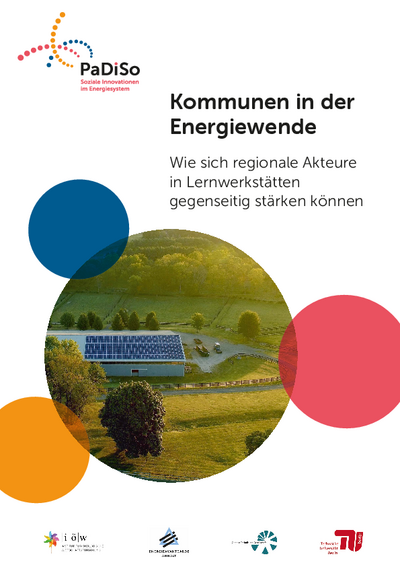Communities in the energy transition How regional actors can strengthen each other in learning workshops
When it comes to their energy supply, municipalities will have to reinvent themselves in the coming years and decades. The tasks are enormous. But where to start? Each municipality's challenges may be specific, but they are not alone in developing concepts. Sharing and networking with each other can help them tackle the energy transition locally. Science and practice have developed a new format for how this can succeed: Municipal learning workshops. The format has been tested in Saxony-Anhalt. Conclusion: With careful planning, such networking workshops can help strengthen local actors in their ability to act. This short brochure of the transdisciplinary research project “Social Innovations in the Energy System” (PaDiSo) presents the experiences gained in the implementation of three learning workshops.
Various municipal stakeholders from Saxony-Anhalt participated in the learning workshops. The learning workshops were designed with the aim of bringing participants into a joint solution-oriented exchange of knowledge and experience in order to discuss and reflect on issues and opportunities for municipal energy transition.
Key insights were:
Participants show great interest and motivation in working together in the learning workshop setting
The participants consider the networking between the municipal stakeholders as very important
- Despite some regional differences, the participants share the same goal: to create a municipal, independent, renewable, price-stable energy supply that is supported by citizens
The main aspects concerning the successful implementation of learning workshops of this kind were identified:
There is a regional key actor on site (here: EAA – Energieavantgarde Anhalt e.V.) who mediates between science and practice
The participation of different regional actors enables an inter-communal exchange, which is seen as very promising and ensures a dynamic process
- If the learning workshops are designed to be methodologically open-ended, this motivates the participants to reflect and exchange
The conceptualization of the learning workshops in three steps with corresponding time intervals and careful preparation made it possible to use a complex but useful “Theory of Change” method. With its help, the participants worked out together which steps could be taken along transformation paths and on which assumptions this sequence of steps is based. Because of the willingness to participate repeatedly, it is possible to build a “Community of Practice” and mutual trust. In this way, the learning workshop format offers a kind of protected space in which participants can engage in open and constructive conversation with each other at eye level.
Furthermore, the brochure offers a brief overview of social innovations in general and their role for the transformation of the energy system. The focus here is on changing social relationships in the form of new ways of thinking, acting and organizing.



